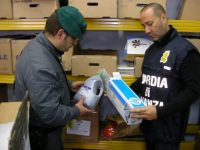Officials from the Guardia di Finanza (GdF) in Ascoli Piceno uncovered the “giant tax fraud”, which involved counterfeit toner cartridges and toner.
Rete8.it (Italian) reported on the GdF’s discovery of the fraud, which involved the “trade of information technology products, toner and cartridges” and which also extended across the region of l’Abruzzo. The site added that 78 companies and 87 people are respectively “in the viewfinder” and were “reported in various capacities” to be involved in the fraud, with some involved in recycling.
The investigation took place after a check on a “batch of cartridges and toners” that were listed with “cut prices”, and which were found to be counterfeit. The investigation found that those involved “issued false invoices” for €484,690,000 ($543,740,183), with companies located in Lombardy, Piedmont, Veneto, Emilia Romagna, Tuscany, Lazio, Umbria, Marche, Abruzzo, Campania, Puglia, Calabria and Sicily all involved.
The so-called “carousel fraud” saw the companies withhold taxes from tax authorities worth €396 million ($444 million) in revenues, €109 million ($122 million) in terms of LRAP (regional tax on productive activities), €8.5 million ($9.5 million) in “wrongly deducted costs”, €1.5 million ($1.6 million) “not paid”, and VAT violations of €147 million ($164 million).
The fraud also saw those involved incorporate a stock of VAT credits worth €70 million ($78 million), with authorities surmising that the scam included the “concealment and destruction of accounting documentation” as well as the “use of money and assets of illicit origin” worth €861,000 ($965,896). The prosecuting agencies have also suggested the scam involved the “introduction into the state of counterfeit products and stolen goods”, with tax audits undertaken of financing companies “that had provided” counterfeit cartridges and toner for a “known brand”, with this particular company’s “entire supply chain in Italy market[ing] cartridges and counterfeit toner”.
Documentation for this specific company was found in Rome and Milan, but investigators have “reconstructed trade with Germany, the Netherlands, Romania, Estonia, Denmark, Austria, the UK, Hungary, Cyprus, Switzerland, Luxembourg and Slovenia”. Products were shipped directly to buyers without “entering the actual availability” of the company, which issued false sales invoices to “nationalise the goods” in each country through “filter companies”.
The article concluded that with this mechanism, the suspects affected legitimate business competition and participated in tenders “for the supply of products to the public administration by offering rock-bottom prices”.

